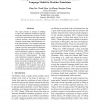Free Online Productivity Tools
i2Speak
i2Symbol
i2OCR
iTex2Img
iWeb2Print
iWeb2Shot
i2Type
iPdf2Split
iPdf2Merge
i2Bopomofo
i2Arabic
i2Style
i2Image
i2PDF
iLatex2Rtf
Sci2ools
ACL
2011
2011
A Large Scale Distributed Syntactic, Semantic and Lexical Language Model for Machine Translation
This paper presents an attempt at building a large scale distributed composite language model that simultaneously accounts for local word lexical information, mid-range sentence syntactic structure, and long-span document semantic content under a directed Markov random field paradigm. The composite language model has been trained by performing a convergent N-best list approximate EM algorithm that has linear time complexity and a followup EM algorithm to improve word prediction power on corpora with up to a billion tokens and stored on a supercomputer. The large scale distributed composite language model gives drastic perplexity reduction over ngrams and achieves significantly better translation quality measured by the BLEU score and “readability” when applied to the task of re-ranking the N-best list from a state-of-theart parsing-based machine translation system.
ACL 2011 | Composite Language | Computational Linguistics | Machine Translation System | Time Complexity |
Related Content
| Added | 23 Aug 2011 |
| Updated | 23 Aug 2011 |
| Type | Journal |
| Year | 2011 |
| Where | ACL |
| Authors | Ming Tan, Wenli Zhou, Lei Zheng, Shaojun Wang |
Comments (0)

